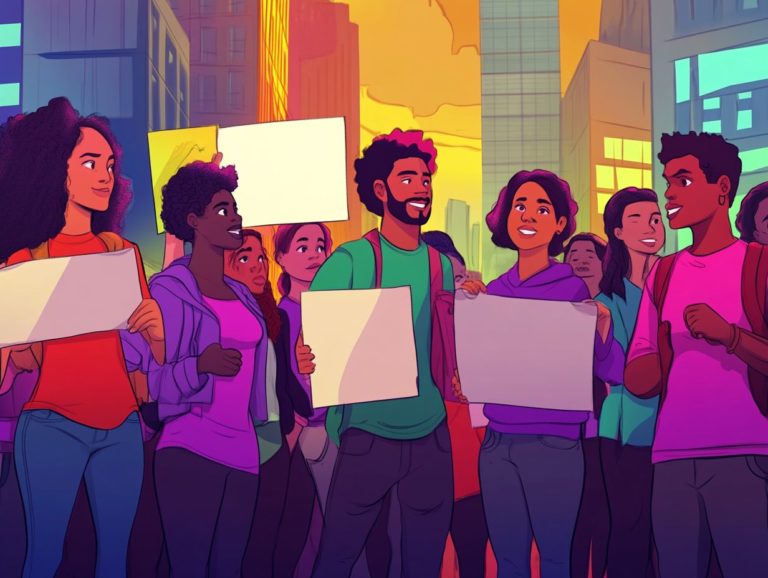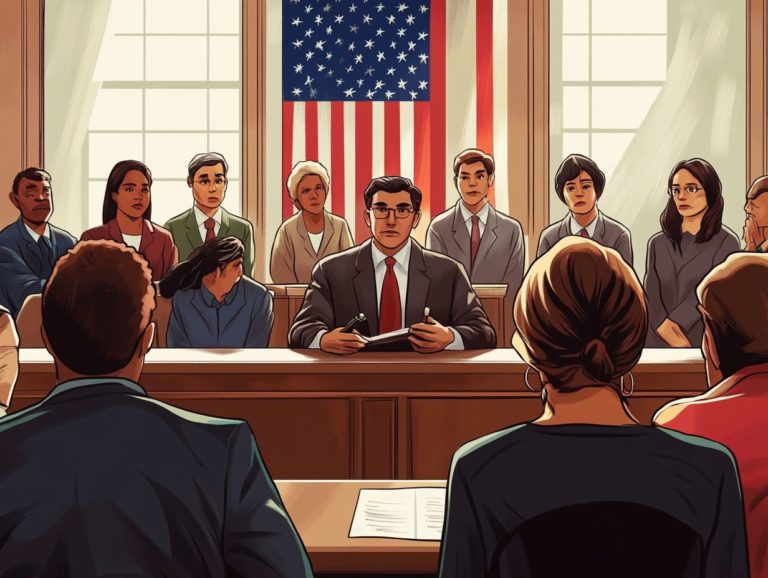Your Rights as a First-Time Offender
Navigating the legal system as a first-time offender can feel daunting. Understanding your rights is vital. This article highlights the essential components of your rights during your arrest, trial, and sentencing. This way, you stay informed at every stage of the process.
You ll discover opportunities for diversion programs, probation, and even the potential for clearing your record. You can find valuable resources and support systems to guide you through this challenging experience.
Empower yourself with knowledge and take control of your situation.
Contents
- Key Takeaways:
- Understanding First-Time Offender Rights
- Rights During Arrest and Booking
- Rights During Trial and Sentencing
- Options for First-Time Offenders
- Expungement and Record Sealing
- Support and Resources for First-Time Offenders
- Frequently Asked Questions
- What are my rights as a first-time offender?
- Do I have the right to an attorney as a first-time offender?
- Can I refuse to answer questions from the police as a first-time offender?
- What happens if I am not informed of my rights as a first-time offender?
- Do I have the right to a fair trial as a first-time offender?
- What are the potential consequences for a first-time offender?
Key Takeaways:

First-time offenders have rights and options during arrest, trial, and sentencing, including the right to legal representation and a fair trial.
You may explore diversion programs, probation, and community service as alternatives to traditional sentencing.
You might also have options to clear your record, but eligibility and processes can vary by jurisdiction.
Understanding First-Time Offender Rights
It’s essential to understand your rights as a first-time offender to navigate the legal system, especially when facing felony or misdemeanor charges that could greatly impact your future.
First-time offenders face distinct challenges. Being informed about your rights helps you avoid conviction and protect your civil liberties during this tough time.
Definition and Eligibility
A first-time offender is generally someone who hasn t been convicted of a crime before and is now facing felony or misdemeanor charges for the first time. This status opens up unique opportunities for you under the Federal First Offender Act and other laws aimed at rehabilitation and diversion.
Your eligibility depends on specific criteria, like having no prior convictions and the unique circumstances of your case. For many, engaging in first-offender programs is an appealing option. These programs often come with requirements aimed at facilitating successful reintegration into society. Keeping your record clean can enhance your career prospects and improve personal relationships.
Access to legal aid can be a game changer as you navigate the legal system. It ensures you receive the guidance and support you need, putting you in a better position to move forward.
Rights During Arrest and Booking
During your arrest and booking, it s crucial for you as a first-time offender to understand and assert your rights. This understanding helps protect your legal rights against potential abuses and misunderstandings from law enforcement.
Among these rights is the right to legal counsel, which is part of the Miranda Rights. These rights exist to support fairness and due process in the legal system.
Miranda Rights and Due Process
Miranda Rights are vital for protecting your rights during police interrogations. They ensure that, as a first-time offender, you know your right to remain silent and to seek legal counsel information that can significantly influence your case outcome.
Grasping these rights is essential, especially if you re navigating the legal system for the first time. If you’re unaware of your Miranda Rights, you might unintentionally make statements that could incriminate you, which can be harmful in court.
This lack of knowledge can undermine the fairness of legal proceedings and contribute to wrongful convictions. The protections offered by these rights are crucial in curbing coercive interrogation tactics and maintaining the integrity of the justice system.
Understanding your rights is key to protecting yourself and upholding the rule of law.
Rights During Trial and Sentencing

During your trial and sentencing, you have several important rights as a first-time offender. These include your right to legal representation and the right to a fair trial both essential elements that uphold the integrity of the judicial process.
These rights ensure that judges’ and prosecutors’ actions align with principles of justice, providing a foundation for an equitable legal experience.
Right to Legal Representation
The right to legal representation is a cornerstone of the legal system, especially for first-time offenders facing serious allegations. Engaging an experienced criminal defense attorney can significantly influence the outcome of your case and help you navigate the complex legal landscape.
When faced with the reality of a criminal charge, securing qualified legal counsel isn t just a wise choice; it s essential. An attorney who specializes in criminal law can provide invaluable insights into the details of your case and craft strategies that could lead to a dismissal or reduction in penalties.
They will assess the evidence and identify potential weaknesses in the prosecution’s argument, ensuring your rights are defended. Good legal representation can change the game for you, turning what could be a life-altering conviction into a more manageable resolution.
This support is critical especially if you’re new to the legal system!
Right to a Fair Trial
The right to a fair trial is a key principle of the justice system, ensuring that first-time offenders receive impartial treatment. This principle allows cases to be evaluated solely on their merits, free from biases that judges and prosecutors may inadvertently bring into the courtroom.
When judges and prosecutors maintain an unbiased approach, they uphold the integrity of the legal process and foster public trust in the system. However, if that impartiality falters due to personal beliefs, external pressures, or procedural missteps the consequences can be severe for those new to navigating the complexities of the legal system.
A fair trial is essential, as even minor violations can lead to unjust sentencing or wrongful convictions. This underscores the fact that the stakes are particularly high for those without prior legal encounters.
Options for First-Time Offenders
As a first-time offender, you have several options that can profoundly impact the trajectory of your legal journey:
- Diversion programs
- Probation
- Community service
These pathways help you avoid a conviction and give you access to important legal aid resources throughout the process.
Diversion Programs
Diversion programs offer a unique opportunity for you as a first-time offender to engage in rehabilitation courses and community service. This can help you avoid jail time and potentially have your charges dismissed upon successful completion.
These programs can vary widely, featuring options such as educational workshops, substance abuse treatment, and mental health counseling tailored to your needs. Your eligibility often depends on the nature of your offense, your criminal history, and sometimes your willingness to participate in community service activities.
The benefits go beyond avoiding a criminal record; you may experience personal growth, improved coping skills, and a deeper connection to your community.
By addressing the underlying issues that contributed to your behavior, you enhance your chances of leading a productive, law-abiding life while contributing to public safety.
Probation and Community Service

Probation and community service are often ideal options for first-time offenders like you. These alternatives allow you to meet your legal obligations while remaining in your community, providing a constructive path that sidesteps incarceration and fosters positive contributions to society.
By embracing these alternatives, you help alleviate the strain on overcrowded correctional facilities and take meaningful responsibility for your actions. Engaging in community service enables you to actively contribute to your neighborhood, nurturing a sense of belonging and accountability.
Probation can include counseling and rehabilitation programs, which are vital for tackling the underlying issues that may have led to your behavior. This holistic approach facilitates smoother reintegration into society and plays a significant role in reducing recidivism rates (the rates at which former offenders commit new crimes), ultimately leading to safer communities for everyone.
Expungement and Record Sealing
Expungement and record sealing are vital processes for first-time offenders seeking to eradicate the lasting effects of a criminal record.
By undertaking these steps, you can easily reintegrate into society, opening doors to job opportunities and educational scholarships, all while shedding the stigma associated with past charges.
Eligibility and Process
Eligibility for expungement and record sealing can differ based on your location. However, if you re a first-time offender, you generally need to meet specific criteria and follow a structured process that often benefits from the expertise of legal counsel.
These requirements typically involve a waiting period, completion of any court-mandated programs, and maintaining a clean record since your conviction.
It s essential to recognize that not all offenses qualify for expungement. For instance, violent crimes or certain misdemeanors often remain on your record.
The procedural steps usually entail filing a petition with the appropriate court, submitting necessary documentation, and perhaps even attending a hearing.
Having legal counsel by your side is crucial, as they can provide invaluable insights into local laws, ensuring that all forms are filled out correctly and that your rights are fully safeguarded throughout this intricate process.
Support and Resources for First-Time Offenders
First-time offenders can find immense value in the array of support and resources available to them.
Community groups, treatment programs, and legal aid services are all designed to assist in rehabilitation and smooth reintegration into society after navigating the complexities of the legal system.
Organizations and Programs
Various organizations and programs are ready to support first-time offenders, offering rehabilitation services and community support to help navigate the challenges of legal issues.
These initiatives aim to lower recidivism rates and equip individuals with essential life skills and employment opportunities.
For example, one prominent organization provides personalized counseling sessions to address specific challenges while guiding individuals in developing effective coping strategies.
Job training programs, linked with local businesses, create pathways to stable employment, enabling successful reintegration.
There are countless inspiring success stories of individuals who have transformed their lives and become active, contributing members of their communities. This holistic approach underscores the critical importance of support systems in fostering rehabilitation and reducing the stigma associated with past offenses.
Frequently Asked Questions

What are my rights as a first-time offender?
As a first-time offender, you have the right to be informed of the charges against you, the right to remain silent, the right to an attorney, and the right to a fair trial.
Do I have the right to an attorney as a first-time offender?
Yes, you have the right to an attorney. If you cannot afford one, the court will appoint a public defender to represent you.
Can I refuse to answer questions from the police as a first-time offender?
Yes, you have the right to remain silent and can refuse to answer any questions from the police. It is always best to speak with an attorney before giving any statements.
What happens if I am not informed of my rights as a first-time offender?
If you were not informed of your rights, any statements you made to the police may be inadmissible in court. It is important to ensure your rights are respected and upheld during the legal process.
Do I have the right to a fair trial as a first-time offender?
Yes, you have the right to a fair trial where the prosecution must prove you are guilty. You are also innocent until proven guilty and have the right to present a defense and cross-examine witnesses.
What are the potential consequences for a first-time offender?
The consequences for a first-time offender will vary depending on the specific charge and jurisdiction. It is important to consult with an attorney to understand the potential consequences and develop an appropriate legal strategy.






